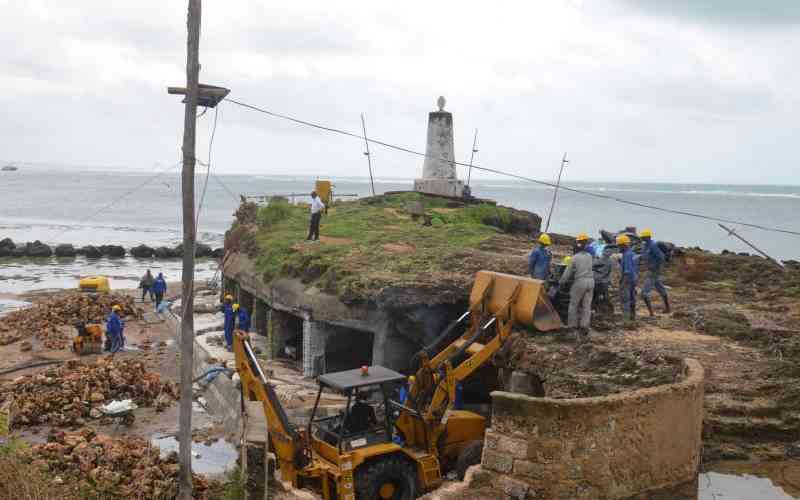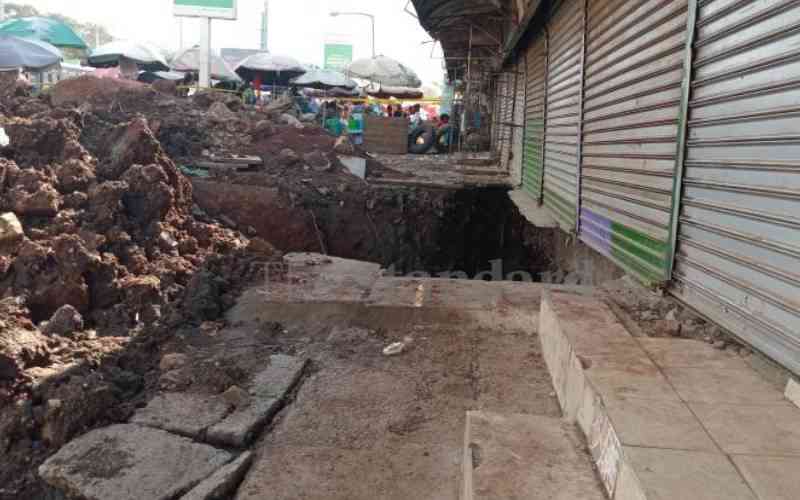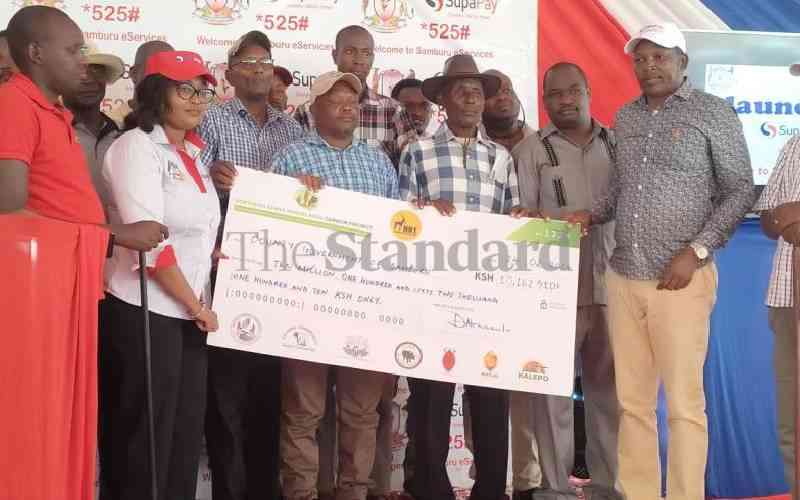In many parts of Kitui County, the search for water can be a gruelling task characterised by walking many kilometres in the blistering sun.
Thus, when this precious commodity is brought closer to the people, there is always great joy. This is why residents of the semi-arid Itivanzou Sub-location are rejoicing; an earth dam constructed by the United Nations Development Programme (UNDP) was recently formally handed over to the community.
When Fred Sigor, the Principal Secretary in the Department of Livestock, unveiled the plaque to commission the dam, men clapped joyously.
And when Sigor, who was accompanied by UNDP deputy country director Fernando Abaga Edjang, opened a tap and water gushed out, a thunderous ululation rent the air as the women present went wild with excitement.
The dam constructed along the Masiundu River can hold 18,000 cubic metres of water and was funded by UNDP at a cost of Sh1.8 million under the Sustainable Land Management (SLM) project, an initiative of the Ministry of Agriculture, Livestock and Fisheries.
Quench thirst
Already, the dam is half full because of the current rains. Residents reckon that when full, it will meet their needs for most of the year.
A short distance from the dam, there are two taps to allow the locals to draw clean water without the risks of drowning.
There is also a huge cemented trough where water will be pumped to quench the thirst of livestock.
The dam is also at a strategic point to help in refilling sand dams downstream, thus raising the water table in the area.
Sigor said the will would provide water for domestic use, support the establishment of tree nurseries and promote food security.
The community, under the Muungano Farmers’ Field School (FFS), donated the land where the dam was constructed and also helped in clearing the bush while staff from the ministry provided technical know-how.
Samuel Wambua, the chairman of Muungano FFS, said the dam would reduce the distance some locals trekked in search of water from ten kilometres to just two kilometres.
It is expected to provide water to about 1,500 people in the neighbouring villages of Katetu, Kiruguni, Tii, Katenga, Kasarani and Itivanzou.
The group has planted more than 300 seedlings around the dam to conserve the environment, and is now focused on growing fruits such as mangoes, paw paws and oranges.
Stay informed. Subscribe to our newsletter
“The water in the dam can last a year, and that means from one rainy season to the next. It’s a big relief to all of us,” Wambua enthused.
Muungano FFS, founded in April, attended a training workshop in Baringo County, sponsored by the ministry, to learn about dry land farming.
Sigor said the overall goal of the SLM project was to foster economic development and bolster sustainable food security while restoring the ecological integrity of arid and semi-arid areas.
“Our objective is to provide the land users and managers with financial incentives, enabling policy and the capacity to improve economic development in dry lands. We want to reduce the dependency on relief food,” noted Sigor.
During the event, 300 Galla goats were distributed to members of the FFS. Each of the members received two goats; one male and one female.
Four districts
Sigor said the project was a five-year pilot programme being undertaken in four districts — Mbeere North in Embu County, Kyuso in Kitui County, Narok North in Narok County and Daadab in Garissa County — to improve food security.
“We want to see how successful the project is in the four districts before rolling out the programme in other dry regions in the country,” the PS explained.
The PS was accompanied by Julius Kiptarus, director at the Department of Livestock, and Dr Zeinab Khalif of UNDP.
 The Standard Group Plc is a
multi-media organization with investments in media platforms spanning newspaper
print operations, television, radio broadcasting, digital and online services. The
Standard Group is recognized as a leading multi-media house in Kenya with a key
influence in matters of national and international interest.
The Standard Group Plc is a
multi-media organization with investments in media platforms spanning newspaper
print operations, television, radio broadcasting, digital and online services. The
Standard Group is recognized as a leading multi-media house in Kenya with a key
influence in matters of national and international interest.
 The Standard Group Plc is a
multi-media organization with investments in media platforms spanning newspaper
print operations, television, radio broadcasting, digital and online services. The
Standard Group is recognized as a leading multi-media house in Kenya with a key
influence in matters of national and international interest.
The Standard Group Plc is a
multi-media organization with investments in media platforms spanning newspaper
print operations, television, radio broadcasting, digital and online services. The
Standard Group is recognized as a leading multi-media house in Kenya with a key
influence in matters of national and international interest.








